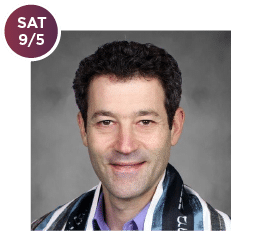-
03 September 2020

By Rabbi Jeffrey Saxe
 My family today is different from my family of origin in many respects. One example: when I was growing up and we had an occasion to go out to eat, the typical scene was quiet and calm: four people, sitting in our station wagon, waiting for each other to suggest a restaurant, each one careful to give deference to the others. Today – though dining out is almost a forgotten luxury during these COVID times – the scene is more chaotic. As the family drives towards one destination, every member of our family of five might be yelling out names of other places to eat, hoping that today, his or her preference will win the day.
My family today is different from my family of origin in many respects. One example: when I was growing up and we had an occasion to go out to eat, the typical scene was quiet and calm: four people, sitting in our station wagon, waiting for each other to suggest a restaurant, each one careful to give deference to the others. Today – though dining out is almost a forgotten luxury during these COVID times – the scene is more chaotic. As the family drives towards one destination, every member of our family of five might be yelling out names of other places to eat, hoping that today, his or her preference will win the day.
Which extreme should be our goal? According to Jewish teachings around humility, the ideal we must strive for is a balance of the two.
One way to prepare ourselves for the High Holy Days is to practice Mussar, the study and cultivation of Jewish soul traits called Middot. There are many important middot, such as patience, generosity and honor. However, I resonate deeply with the wisdom that all of them lead us back to a central one: humility. After all, how can we be patient, generous or give proper honor to another if we lack humility and are wrapped up in ourselves?
Moses, we are told in the Torah, was the humblest person on the earth. While he had moments of being meek, such as when he protested to God that he was not the one to lead the people out of Egypt – his is known more for his moments of stepping forward than his moments of shying away. We learn from this that humility is not about seeing ourselves as small. It is about having a clear vision of where we fit into to the events taking place around us; of how we can be most helpful in achieving a worthy outcome; and of when to remind ourselves that it is not about us.
Mussar offers us a few practices to bring humility into our consciousness. Perhaps we can try one or more of them today. The first is to reflect on and repeat a mantra throughout the day. A good one I learned from my Mussar teacher, Alan Morinis, is, “No more than my space, no less than my place.” This mantra teaches us that like all Middot, the ideal achievement of humility is to strike a balance: not to be extremely meek or mild any more than to be overly conceited or self-centered. There are times when we must step back and allow others to take up space, and there are times when what is required from us is to step in and fill an important role. The most important thing is to remember that when we do so, it cannot be to serve our own ego or achieve a selfish goal.
Another practice to try is to experiment with pushing yourself towards one side of the balance or the other, depending on your personal tendencies. If you are the type of person who tends to insert yourself more than you should, make a point of holding back today, taking less space. Wait a few more beats than usual, and listen longer, before taking your turn in a conversation. Take extra care to pull your things close to you, so they are not in your loved one’s way at the table. Take an extra measure to give credit to another for something they did.
On the other hand, if you are the type of person who tends to be more self-effacing or modest than you should, try to step more into your rightful space today. Push yourself to say what you are thinking in a conversation, rather than only letting others speak. Take the best seat in the living room that you usually leave for your loved ones. Speak up if a person has offended you, and gently but clearly let them know.
Our humility deeply affects our lives and the lives of others. When it comes to relationships, we all have muscles for expansion and contraction. As my family experiences remind us, there are times when we are needed to exercise both.
